
Carbon black manufacturing company Monolith Materials (Monolith) claims to have perfected its technology to now produce the rubber additive from natural gas rather than petroleum or crude oil. Monolith plans to incorporate the more sustainable method this fall at a 500,000-sq.-ft. “Olive Creek” facility in the tiny village of Hallam in Nebraska. Olive Creek will be the first carbon black plant to be built for scaled-up production in the US in the last 50 years.
A majority of the performance-enhancing carbon black is traditionally produced from crude oil, which, through heat, breaks down into carbon black (carbon) and carbon dioxide (CO2). However, using natural gas, which breaks down into carbon and hydrogen through pyrolysis, is a greener option – according to Chris Cornille, Chief commercial and supply chain officer for Monolith, hydrogen can be repurposed as an energy source to power not only utilities, turbines and other functions at the plant, but the surrounding community as well. Cornille said hydrogen can also be used as an additive in chemicals and fertilisers, in fuel cells, and in transportation.
Reviewing and refining data and design from its pilot “Seaport” plant in Redwood City, California, Monolith expects the Olive Creek facility to first produce about 14,000 metric tonnes per year of carbon black, after Phase I completion. While typical production runs for carbon black are in the 120,000- to 160,000-tonne-per-year yield, Monolith believes it will reach similar capacity when it expands with Olive Creek Phase II, set for its first high-capacity production run in 2024.
Olive Creek will also have the ability to produce upwards of 125 megawatts (MW) of electricity via the hydrogen co-product; Olive Creek Phase II could add up to 500 jobs as well.
“It all started with a vision from founders Rob (Hanson) and Pete (Johnson) using two key components – a model that is environmentally transformative and profitable,” Cornille said. “Some businesses have a great environmental story, but they are not sustainable. To do both together is very hard and it takes innovative technology.
“We are about to do something very special with this project – we are going to make a positive impact on the Earth. We are certainly excited as customers buy product from us, but this is a production process that is going to help our children and our grandchildren.”
Monolith’s headquarters are located just outside Hallam in Lincoln, and its use of hydrogen for clean power generation has led to a first-of-its-kind partnership with the Nebraska Public Power District, Nebraska’s largest provider of electricity. Monolith’s target industries for carbon black as now include tyre, mechanical rubber goods (non-tyre) and specialty, non-rubber products.
“I’m proud to say that Monolith’s project is deploying advanced technologies that set the bar much higher in terms of environmental responsibility and sustainable business practices,” said Lincoln Mayor Chris Beutler. The additional 100 jobs at the Olive Creek location is also “a great, great business for Lincoln.”
